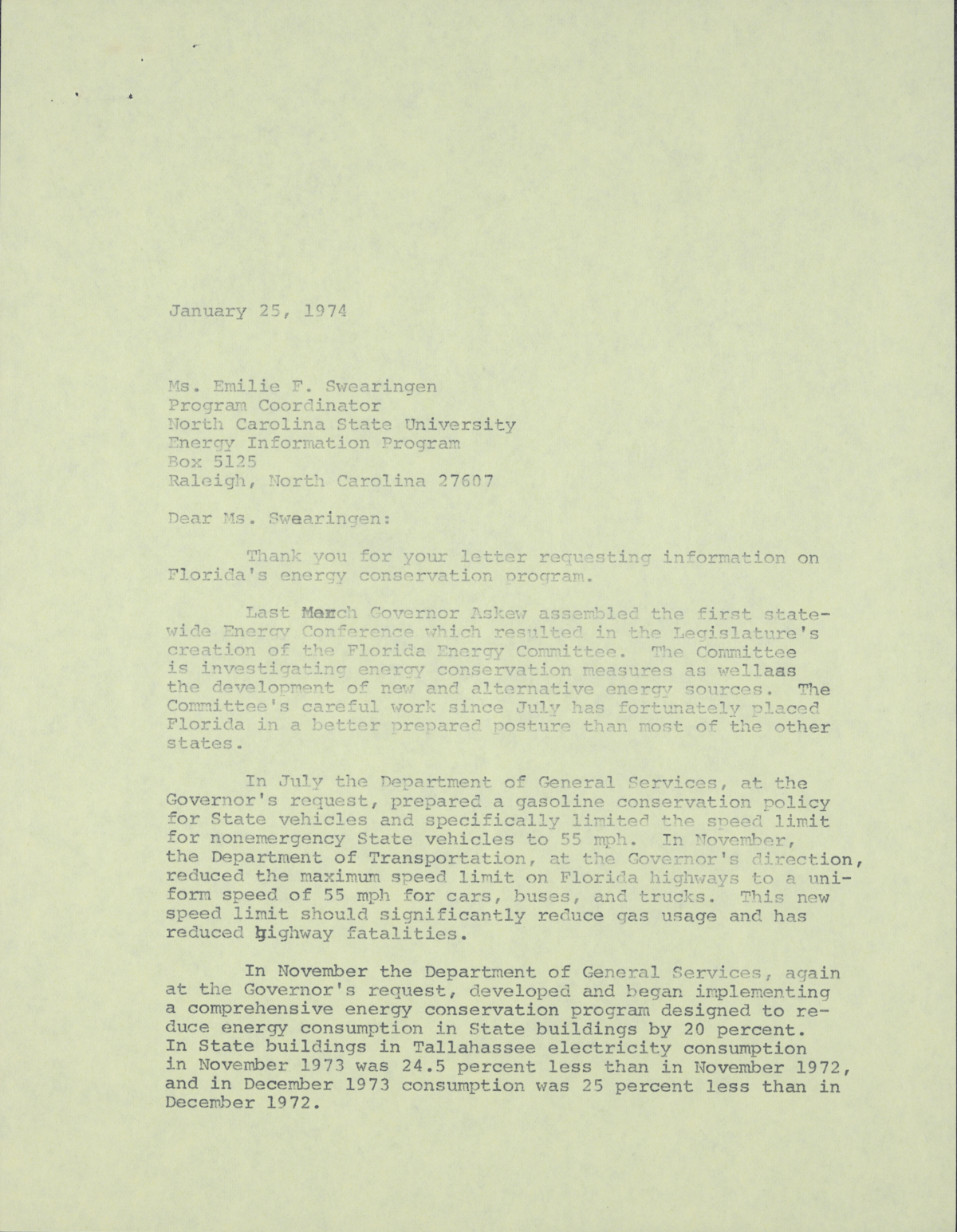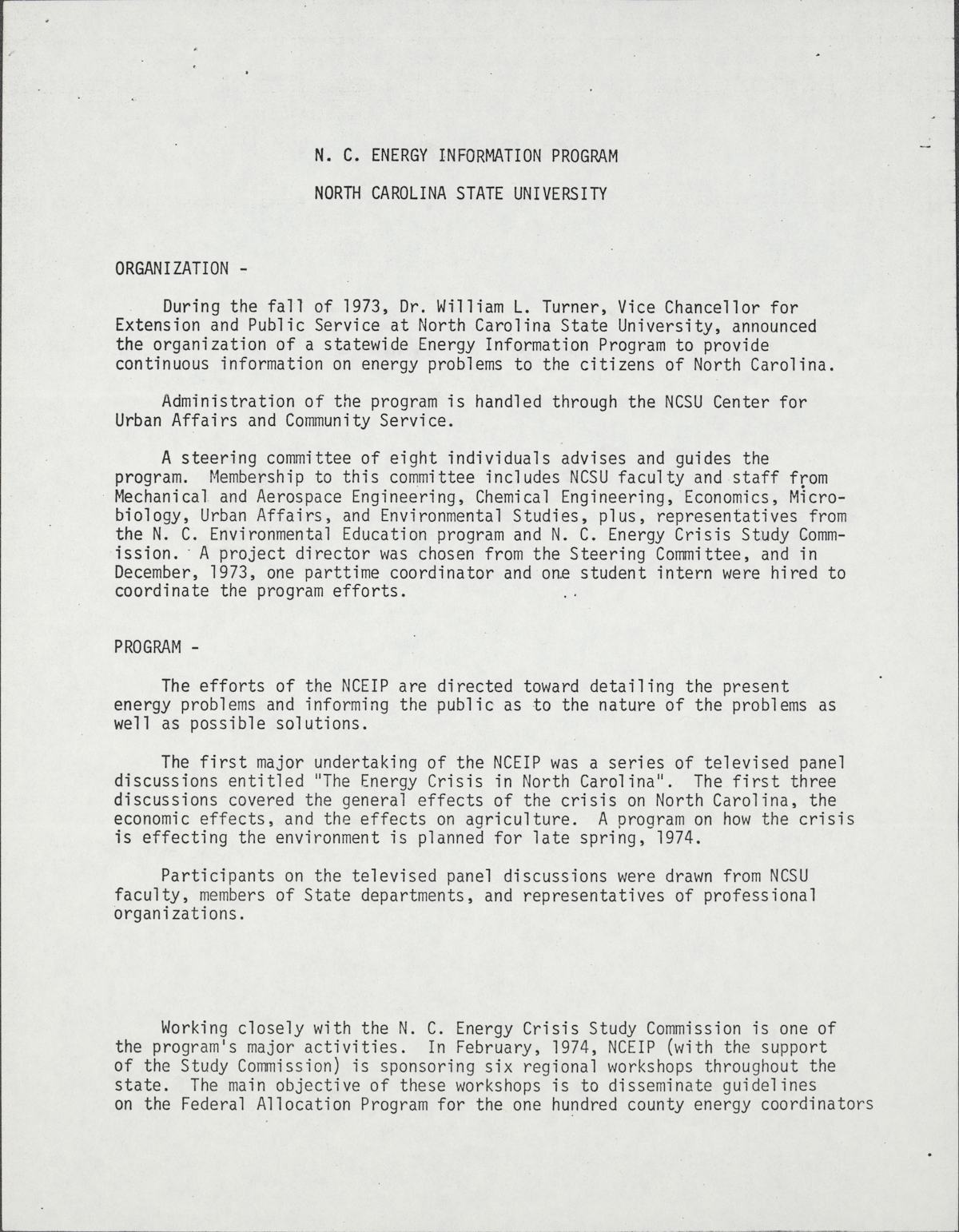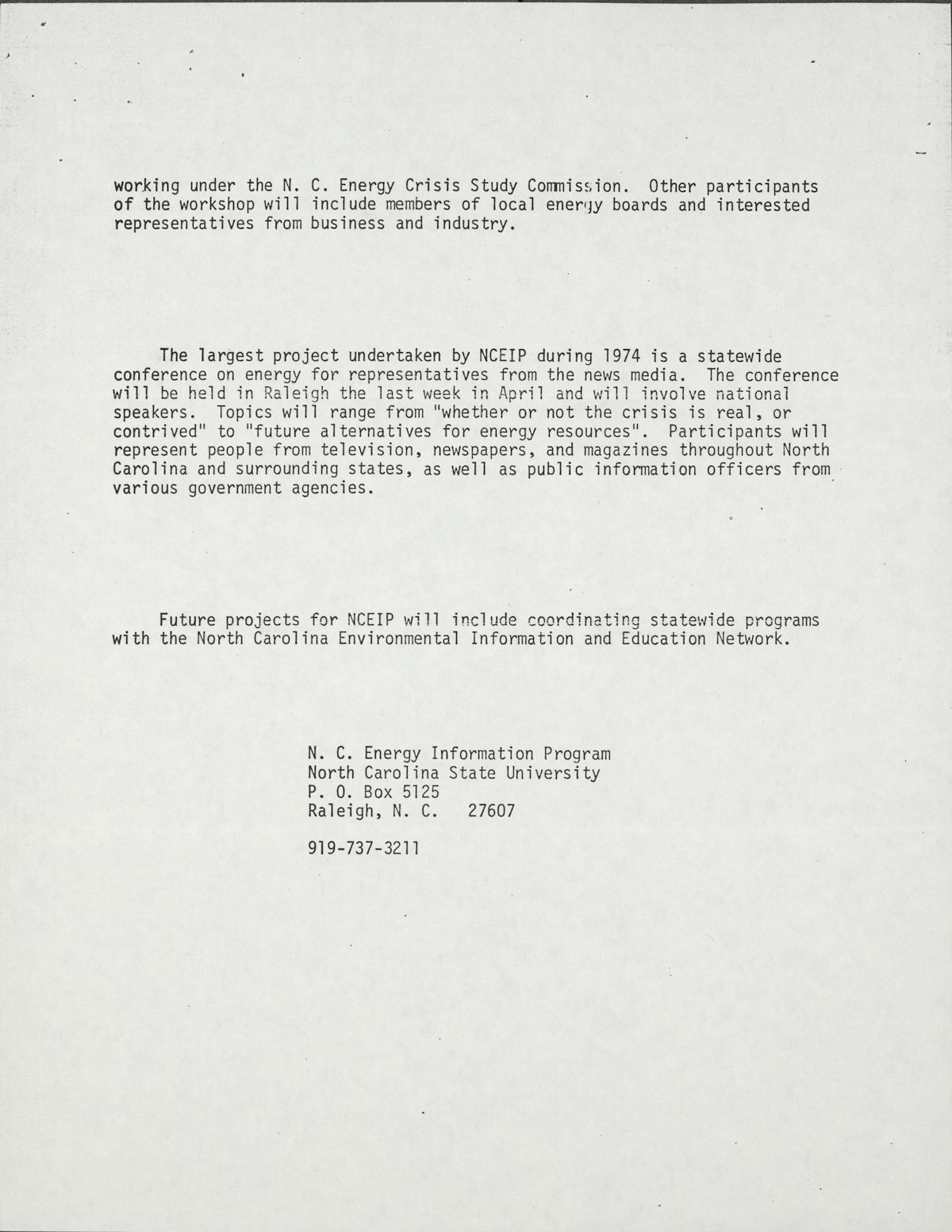Florida Memory is administered by the Florida Department of State, Division of Library and Information Services, Bureau of Archives and Records Management. The digitized records on Florida Memory come from the collections of the State Archives of Florida and the special collections of the State Library of Florida.

State Archives of Florida
- ArchivesFlorida.com
- State Archives Online Catalog
- ArchivesFlorida.com
- ArchivesFlorida.com
State Library of Florida
Related Sites

Description of previous item
Description of next item

Letters between Emilie F. Swearingen, program coordinator of the North Carolina Energy Information Program at North Carolina State Univerisity at Raleigh, and Governor Askew's administration regarding energy problems and conservation, 1974
Source
Description
Date
Contributors
Format
Topic
Subjects
Geographic Term
General Note
In 1973, members of the Organization of Arab Petroleum Exporting Countries (OAPEC) placed an oil embargo on the United States in response to President Nixon’s support of Israel during the Yom Kippur War.
With energy shortages and skyrocketing prices, the United States had to create strategies for conserving fuel. President Nixon even created a new agency called the Federal Energy Office, later the Federal Energy Administration. Other tactics included reducing highway speed limits to 55 miles per hour, and putting the country on year-round Daylight Saving Time.
Although the oil embargo was lifted in March of 1974, the impacts of the crisis were felt throughout the rest of the decade. The United States was in an economic recession until 1975, and the country experienced a second energy crisis in 1979 in the aftermath of the Iranian Revolution.
Ms. Emilie FP. Swearingen
Program Coordinator
North Carolina State University
Energy Information Program
Box 5125
Raleigh, North Carolina 27607
Dear Ms. Swearingen:
Thank you for your letter requesting information on Florida's energy conservation program.
Last March Governor Askew assembled the first state-wide Energy Conference which resulted in the Legislature's creation of the Florida Energy Committee. The Committee is investigating energy conservation measures as wellaas [sic.] the development of new and alternative energy sources. The Committee's careful work since July has fortunately placed Florida in a better prepared posture than most of the other states.
In July the Department of General Services, at the Governor's request, prepared a gasoline conservation policy for State vehicles and specifically limited the speed limit for nonemergency State vehicles to 55 mph. In November, the Department of Transportation, at the Governor's direction, reduced the maximum speed limit on Florida highways to a uniform speed of 55 mph for cars, buses, and trucks. This new speed limit should significantly reduce gas usage and has reduced Highway fatalities.
In November the Department of General Services, again at the Governor's request, developed and began implementing a comprehensive energy conservation program designed to re duce energy consumption in State buildings by 20 percent. In State buildings in Tallahassee electricity consumption in November 1973 was 24.5 percent less than in November 1972, and in December 1973 consumption was 25 percent less than in December 1972.
Title
Subject
Description
Creator
Source
Date
Contributor
Format
Language
Type
Identifier
Coverage
Geographic Term
Thumbnail
ImageID
topic
Subject - Corporate
Subject - Person
Transcript
Ms. Emilie FP. Swearingen
Program Coordinator
North Carolina State University
Energy Information Program
Box 5125
Raleigh, North Carolina 27607
Dear Ms. Swearingen:
Thank you for your letter requesting information on Florida's energy conservation program.
Last March Governor Askew assembled the first state-wide Energy Conference which resulted in the Legislature's creation of the Florida Energy Committee. The Committee is investigating energy conservation measures as wellaas [sic.] the development of new and alternative energy sources. The Committee's careful work since July has fortunately placed Florida in a better prepared posture than most of the other states.
In July the Department of General Services, at the Governor's request, prepared a gasoline conservation policy for State vehicles and specifically limited the speed limit for nonemergency State vehicles to 55 mph. In November, the Department of Transportation, at the Governor's direction, reduced the maximum speed limit on Florida highways to a uniform speed of 55 mph for cars, buses, and trucks. This new speed limit should significantly reduce gas usage and has reduced Highway fatalities.
In November the Department of General Services, again at the Governor's request, developed and began implementing a comprehensive energy conservation program designed to re duce energy consumption in State buildings by 20 percent. In State buildings in Tallahassee electricity consumption in November 1973 was 24.5 percent less than in November 1972, and in December 1973 consumption was 25 percent less than in December 1972.
On November 1, 1973 the State began participating in the federal mandatory allocation program for middle distillate fuels (kerosene, diesel, and home heating oil). Since this date the State has shifted over one million gallons to help assist businesses and individuals who were suffering | hardships and emergencies. Furthermore the Governor has asked each County Commission to establish a mandatory system at the local level to assure that each household is treated fairly and receives enough heating oil to keep warm this winter.
In November the Governor appointed the Fuel Allocation and Conservation Advisory Council. The Council consists of state and local public officials and representatives of consumers, labor, petroleum suppliers, and business. The Governor has asked each sector of the economy to submit to him a comprehensive plan which would provide for a 25 percent reduction in energy consumption and to begin to implement it voluntarily.
During the last week in November President Nixon asked all gas stations to close on Sunday. Governor Askew asked that all stations in Florida comply with this request. On January 15, 1974 Governor Askew asked gas stations on the Florida Turnpike to reopen due to the severe drop in tourism- Florida's major source of economy.
If you wish additional information you may wish to contact Martin Yarosh, Executive Director, Florida Energy Committee, Room 244 Senate Office Building, Tallahassee, Florida 32394.
Sincerely, yours,
Howell L. Ferguson
Governmental Assistant
HLF/jh
ENERGY INFORMATION PROGRAM
BOX 5125 ZIP 27607 919-737-3211
Dear Sir:
The organization of the North Carolina Energy Information Program to provide continuous information on energy problems to the citizens of North Carolina was announced in the fall of 173. One of the aims of this organization is to contact other state organizations and personnel, nationwide, for the purpose of exhanging [sic.] information on energy conservation. Ware enclosing information about our program and its activities.
We would like to know about the new proposed energy programs in your state and their activities.
We are looking forward to hearing from you.
Sincerely,
Emilie F. Swearingen [signed]
Emilie F. Swearingen
Program Coordinator
EFS: el
Encl.
NORTH CAROLINA STATE UNIVERSITY
ORGANIZATIONN -
During the fall of 1973, Dr. William L. Turner, Vice Chancellor for Extension and Public Service at North Carolina State University, announced the organization of a statewide Energy Information Program to provide continuous information on energy problems to the citizens of North Carolina.
Administration of the program is handled through the NCSU Center for Urban Affairs and Community Service.
A steering committee of eight individuals advises and guides the program. Membership to this committee includes NCSU faculty and staff from Mechanical and Aerospace Engineering, Chemical Engineering, Economics, Microbiology, Urban Affairs, and Environmental Studies, plus, representatives from the N. C. Environmental Education program and N. C. Energy Crisis Study Commission. A project director was chosen from the Steering Committee, and in December, 1973, one parttime coordinator and one student intern were hired to coordinate the program efforts.
PROGRAM -
The efforts of the NCEIP are directed toward detailing the present energy problems and informing the public as to the nature of the problems as well as possible solutions.
The first major undertaking of the NCEIP was a series of televised panel discussions entitled "The Energy Crisis in North Carolina". The first three discussions covered the general effects of the crisis on North Carolina, the economic effects, and the effects on agriculture. A program on how the crisis is effecting the environment is planned for late spring, 1974.
Participants on the televised panel discussions were drawn from NCSU faculty, members of State departments, and representatives of professional organizations.
Working closely with the N. C. Energy Crisis Study Commission is one of the program's major activities. In February, 1974, NCEIP (with the support of the Study Commission) is sponsoring six regional workshops throughout the State. The main objective of these workshops is to disseminate guidelines on the Federal Allocation Program for the one hundred county energy coordinators
The largest project undertaken by NCEIP during 1974 is a statewide conference on energy for representatives from the news media. The conference will be held in Raleigh the last week in April and will involve national speakers. Topics will range from “whether or not the crisis is real, or contrived” to “future alternatives for energy resources”. Participants will represent people from television, newspapers, and magazines throughout North Carolina and surrounding states, as well as public information officers from various government agencies.
Future projects for NCEIP will include coordinating statewide programs with the North Carolina Environmental Information and Education Network.
N. C. Energy Information Program
North Carolina State University
P. O. Box 5125
Raleigh, N. C. 27607
919-737-3211
General Note
In 1973, members of the Organization of Arab Petroleum Exporting Countries (OAPEC) placed an oil embargo on the United States in response to President Nixon’s support of Israel during the Yom Kippur War.
With energy shortages and skyrocketing prices, the United States had to create strategies for conserving fuel. President Nixon even created a new agency called the Federal Energy Office, later the Federal Energy Administration. Other tactics included reducing highway speed limits to 55 miles per hour, and putting the country on year-round Daylight Saving Time.
Although the oil embargo was lifted in March of 1974, the impacts of the crisis were felt throughout the rest of the decade. The United States was in an economic recession until 1975, and the country experienced a second energy crisis in 1979 in the aftermath of the Iranian Revolution.
Chicago Manual of Style
Swearingen, Emilie F. Letters between Emilie F. Swearingen, program coordinator of the North Carolina Energy Information Program at North Carolina State Univerisity at Raleigh, and Governor Askew's administration regarding energy problems and conservation, 1974. 1974. State Archives of Florida, Florida Memory. <https://www.floridamemory.com/items/show/350884>, accessed 3 December 2024.
MLA
Swearingen, Emilie F. Letters between Emilie F. Swearingen, program coordinator of the North Carolina Energy Information Program at North Carolina State Univerisity at Raleigh, and Governor Askew's administration regarding energy problems and conservation, 1974. 1974. State Archives of Florida, Florida Memory. Accessed 3 Dec. 2024.<https://www.floridamemory.com/items/show/350884>
AP Style Photo Citation
(State Archives of Florida/Swearingen)

 Listen: The Assorted Selections Program
Listen: The Assorted Selections Program


